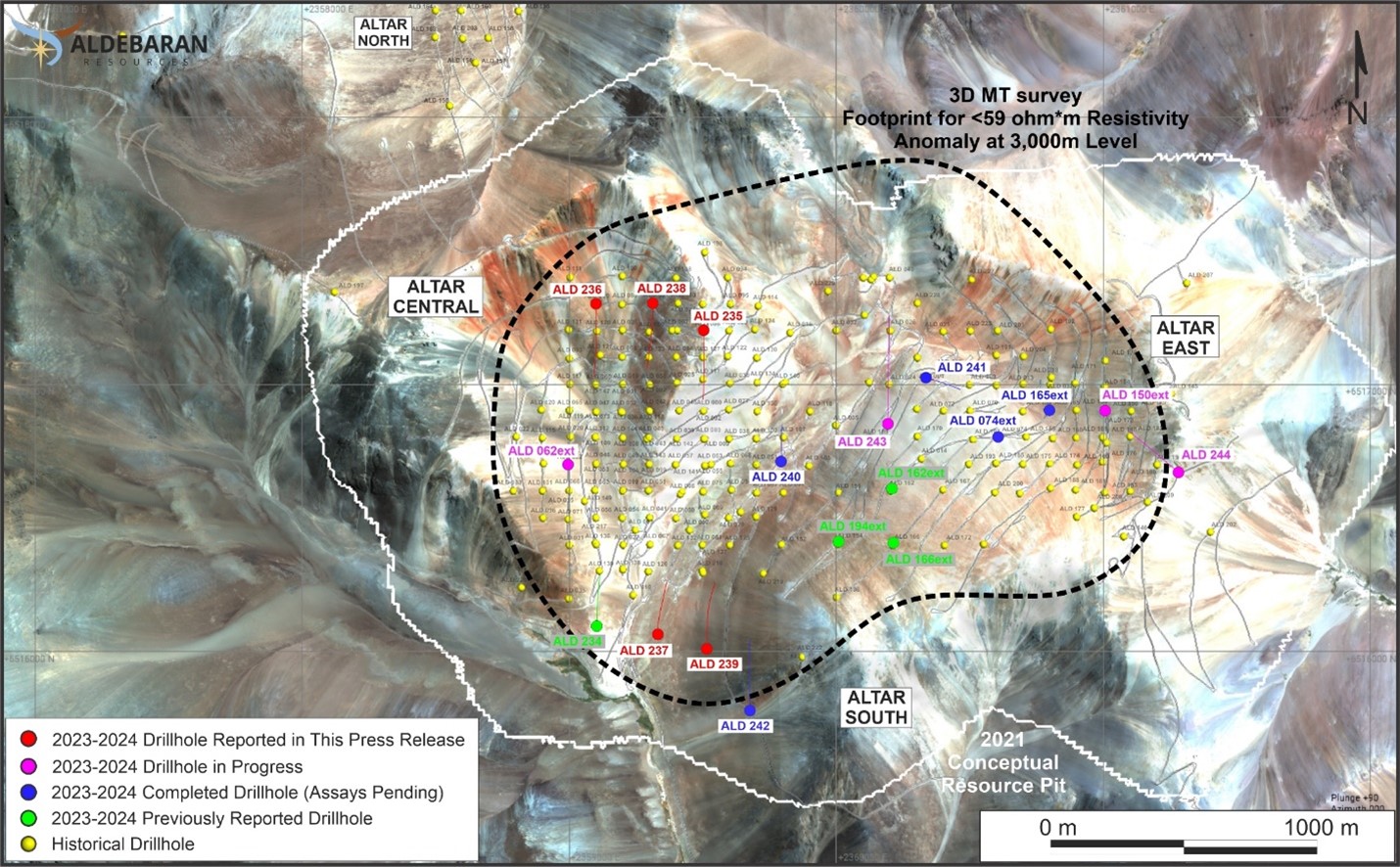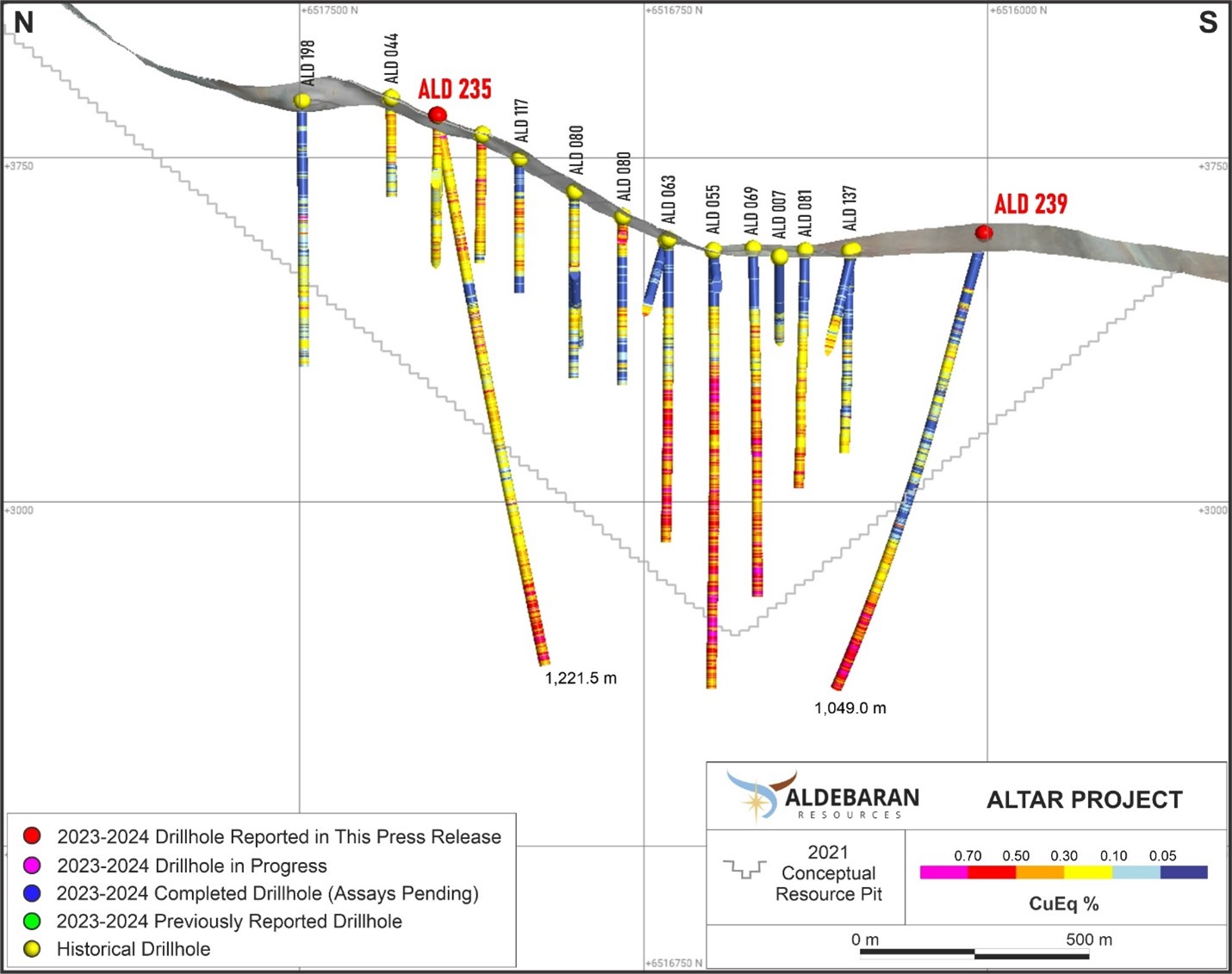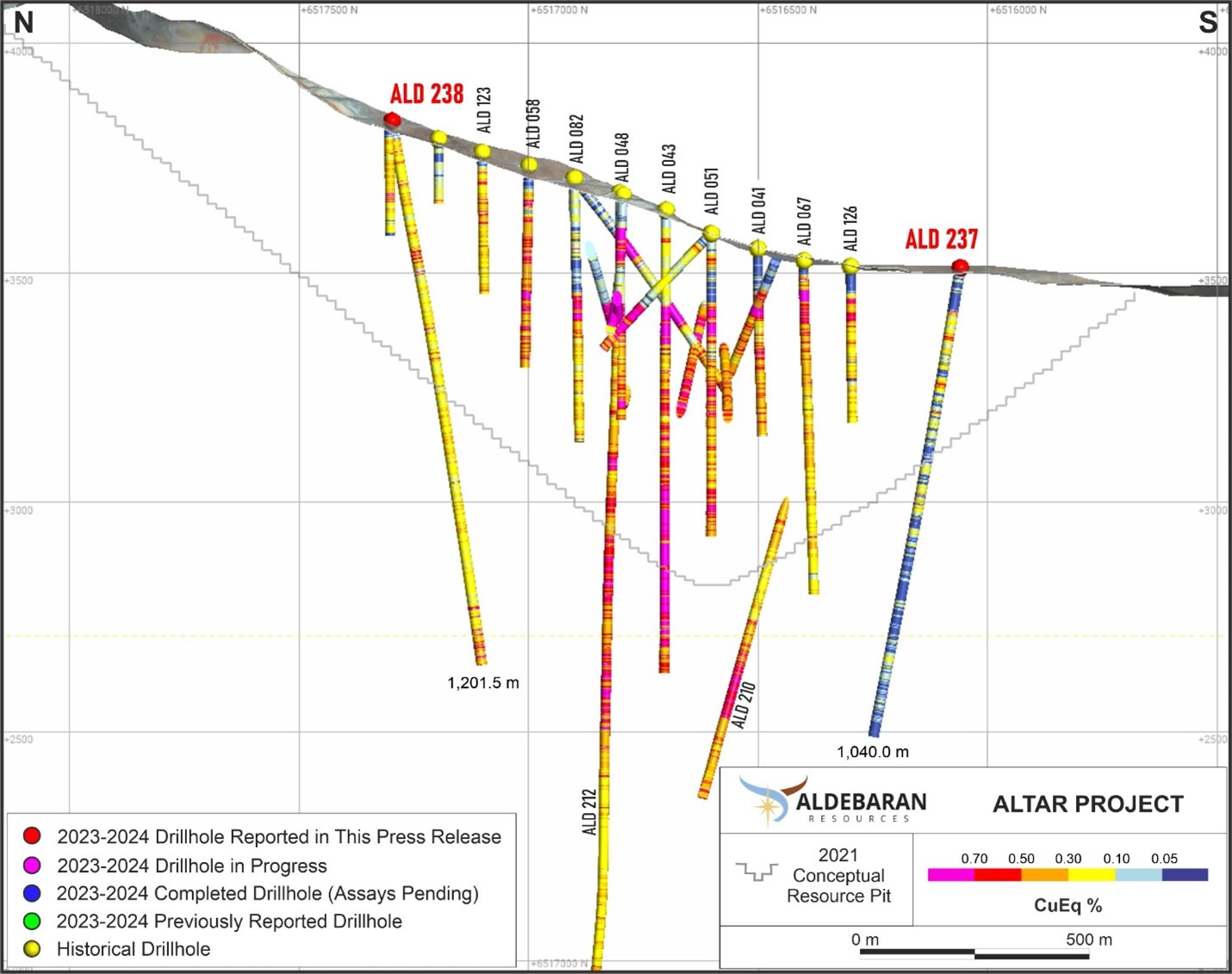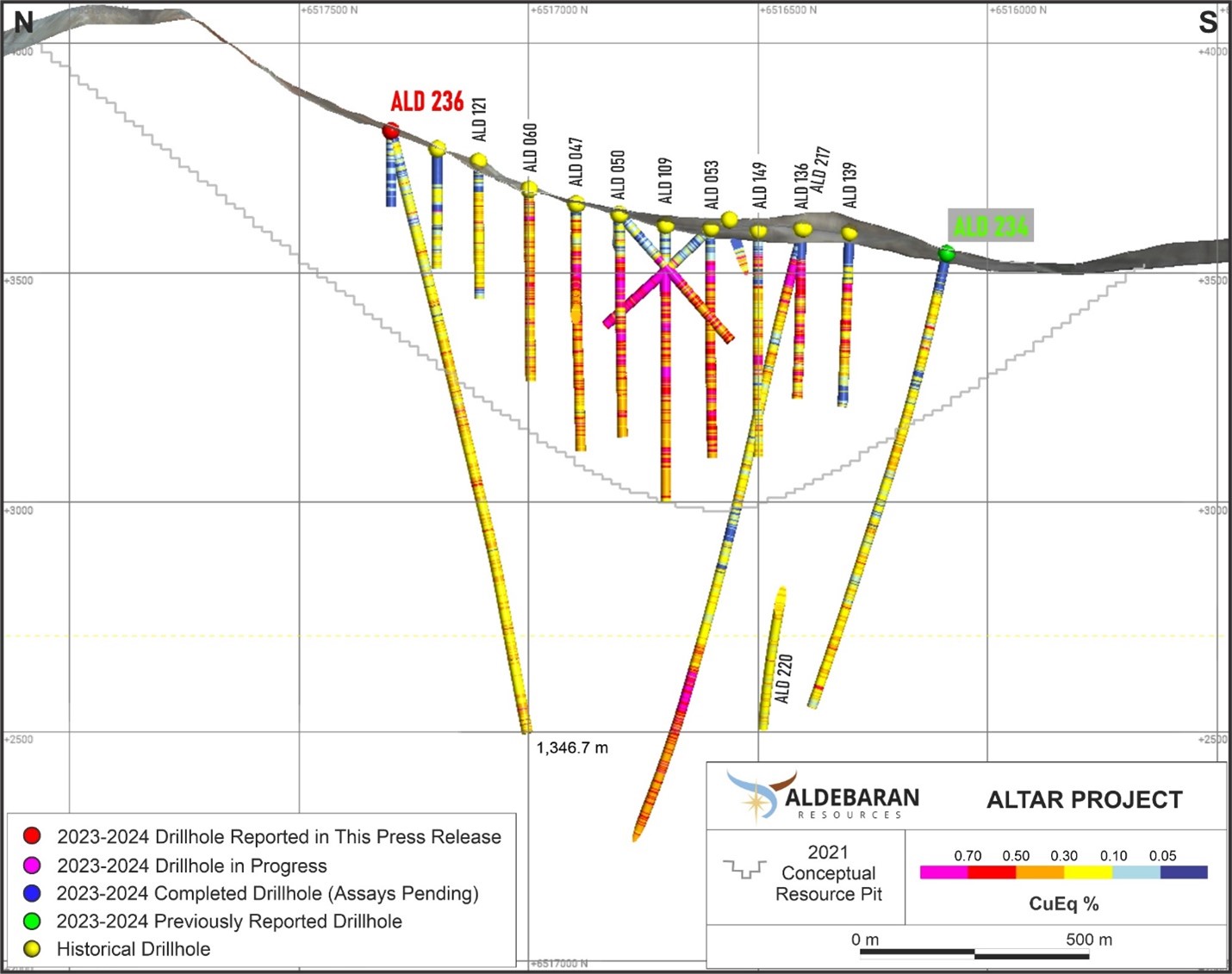VANCOUVER, BC / ACCESSWIRE / March 28, 2024 /Aldebaran Resources Inc. ("Aldebaran" or the "Company") (TSXV:ALDE)(OTCQX:ADBRF) is pleased to report results for five drill holes of the 2023/2024 field campaign at the Altar copper-gold project in San Juan, Argentina. The holes reported herein (ALD-24-235, ALD-24-236, ALD-24-237, ALD-24-238 and ALD-24-239) were all substantial step-outs to the north or south of known mineralization. The holes were designed to test the edges of known mineralization and expand the mineralized footprint within the large, conductive MT geophysical anomaly at the Altar project (see June 13, 2022 Company press release). All holes hit mineralization and successfully extended the mineralized footprint of the deposit.
Highlights
ALD-24-235
- 362.50 m of 0.34% CuEq from 3.90 m depth
- Including 78.00 m of 0.54% CuEq from 25.00 m depth
- 357.80 m of 0.27% CuEq from 424.20 m depth
- Including 110.00 m of 0.41% CuEq from 428.00 m depth
- 410.50 m of 0.36% CuEq from 811.00 m depth
- Including 266.50 m of 0.45% CuEq from 955.00 m depth
- Including 182.50 m of 0.52% CuEq from 1,039.00 m depth
- Hole ended in this mineralization
ALD-24-236
- 1,133.70 m of 0.23% CuEq from 213.00 m depth
ALD-24-237
- 129.50 of 0.20% CuEq from 95.50 m depth
ALD-24-238
- 1,159.50 m of 0.24% CuEq from 42.00 m depth
- Including 53.85 m of 0.46% CuEq from 274.00 m depth
- Including 91.50 m of 0.47% CuEq from 1,110.00 m depth
ALD-24-239
- 77.10 m of 0.19% CuEq from 250.00 m depth
- Adds mineralization to an area that was defined as waste in 2021 resource estimate
- 353.00 m of 0.46% CuEq from 696.00 m depth
- Including 233.00 m of 0.59% CuEq from 816.00 m depth
- Including 122.00 m of 0.65% CuEq from 927.00 m depth
- Hole ended in mineralization
- Mineralization hosted in rhyolite, which historically at Altar has been a poor host rock and only mineralized when it's close to a mineralized porphyry intrusion
John Black, Chief Executive Officer of Aldebaran, commented as follows: "Drilling at Altar continues to grow the mineralized footprint of the deposit. With the drill holes reported today, we've extended known mineralization substantially to the north and south. To date, most of the reported drilling results from the 2023/2024 campaign have been from holes on the edges of the deposit where there was little to no drilling completed historically. While these holes may not be the most exciting from a grade perspective, they provide valuable information and are necessary to complete a resource update later this year. Moving forward, most of the remaining holes will focus on the core of the deposit, with a particular focus on growing Altar United and Altar East."
Dr. Kevin B. Heather, Chief Geological Officer of Aldebaran, commented as follows: "These results are important for several reasons: extending the mineralized footprint outward to the north and south will allow us to capture better grade mineralization at depth for the upcoming mineral resource update, and at the same time we are converting near surface rock from waste to mineralization. Hole 239 is interesting as the hole ended due to drill rig depth capacity; however, the grades are increasing with depth, which suggests we may be getting close to an undiscovered mineralized porphyry intrusion."
Table 1 below shows detailed assays for all holes. Figure 1 displays a plan map of the completed and ongoing drill hole locations, while Figures 2, 3 and 4 display cross-sections of the holes reported herein.
| Table 1 - Drill Hole Results - Altar Project |
|
From
(m) |
To
(m) |
Interval
(m) |
Cu
(%) |
Au
(g/t) |
Ag
(g/t) |
Mo
(ppm) |
As
(ppm) |
CuEq
(%) |
| ALD-24-235 |
| Interval |
3.90 |
366.40 |
362.50 |
0.27 |
0.08 |
1.09 |
15 |
408 |
0.34 |
|
Incl.
|
25.00 |
103.00 |
78.00 |
0.45 |
0.10 |
2.07 |
22 |
1,031 |
0.54 |
| Interval |
424.20 |
782.00 |
357.80 |
0.24 |
0.03 |
0.66 |
18 |
436 |
0.27 |
|
Incl.
|
428.00 |
538.00 |
110.00 |
0.36 |
0.05 |
1.03 |
7 |
1,017 |
0.41 |
| Interval |
811.00 |
1,221.50 |
410.50 |
0.31 |
0.02 |
1.35 |
82 |
90 |
0.36 |
|
Incl.
|
955.00 |
1,221.50 |
266.50 |
0.40 |
0.02 |
1.13 |
104 |
68 |
0.45 |
|
Incl.
|
1,039.00 |
1,221.50 |
182.50 |
0.46 |
0.02 |
1.41 |
110 |
54 |
0.52 |
| ALD-24-236 |
| Interval |
26.30 |
52.00 |
25.70 |
0.11 |
0.03 |
2.23 |
15 |
256 |
0.16 |
| Interval |
107.00 |
124.00 |
17.00 |
0.30 |
0.05 |
1.96 |
20 |
758 |
0.35 |
| Interval |
145.00 |
190.00 |
45.00 |
0.10 |
0.09 |
0.57 |
28 |
62 |
0.17 |
| Interval |
213.00 |
1,346.70 |
1,133.70 |
0.20 |
0.02 |
0.63 |
46 |
125 |
0.23 |
| ALD-24-237 |
| Interval |
95.50 |
225.00 |
129.50 |
0.18 |
0.02 |
0.30 |
3 |
91 |
0.20 |
| Interval |
243.00 |
275.00 |
32.00 |
0.30 |
0.08 |
1.15 |
2 |
1245 |
0.36 |
| Interval |
480.00 |
539.50 |
59.50 |
0.12 |
0.02 |
0.43 |
9 |
65 |
0.14 |
| ALD-24-238 |
| Interval |
42.00 |
1201.50 |
1159.50 |
0.21 |
0.03 |
1.62 |
22 |
216 |
0.24 |
|
Incl.
|
274.00 |
327.85 |
53.85 |
0.39 |
0.08 |
2.03 |
9 |
1147 |
0.46 |
|
Incl.
|
1,110.00 |
1,201.50 |
91.50 |
0.38 |
0.03 |
7.00 |
45 |
402 |
0.47 |
| ALD-24-239 |
| Interval |
250.00 |
327.10 |
77.10 |
0.18 |
0.01 |
0.34 |
4 |
49 |
0.19 |
| Interval |
696.00 |
1,049.00 |
353.00 |
0.40 |
0.02 |
1.08 |
124 |
236 |
0.46 |
|
Incl.
|
816.00 |
1,049.00 |
233.00 |
0.50 |
0.02 |
1.33 |
174 |
299 |
0.59 |
|
Incl.
|
866.00 |
904.00 |
38.00 |
0.48 |
0.02 |
1.22 |
482 |
381 |
0.66 |
|
Incl.
|
927.00 |
1,049.00 |
122.00 |
0.57 |
0.02 |
1.49 |
145 |
344 |
0.65 |
|
The grades are uncut. CuEq values were calculated using copper, gold, silver, and molybdenum. Metal prices utilized for the calculations are Cu = US$3/lb, Au = US$1,400/oz, Ag = US$18/oz, and Mo = US$10/lb. Recoveries used for the supporting metals found in the CuEq equation are as follows: Au = 50%, Ag = 51%, (based on historical metallurgical test work) and Mo = 70% (benchmarking from similar deposits). The formula utilized to calculate equivalent values is CuEq % = Cu % + (Au g/t * 0.34025) + (Ag g/t * 0.00446) + (Mo ppm * 0.00023).
|
Discussion of Results
ALD-24-235
ALD-24-235 (Figure 2) was collared on the northern edge of the Altar Central zone. It was drilled to the south at -79 degrees dip and to a final depth of 1,221.50 m. The main purpose of this hole was to test the northern extension of the mineralization at Altar Central.
Lithology: Drillhole ALD-24-235 intersected a medium sized grain diorite porphyry from surface to 655 m depth, then transitioning into andesite wall rocks and later to rhyolite extending from 732 m to 1107 m depth. The hole continues below that depth into andesitic rocks until the bottom of the hole.
Alteration & Mineralization: The base of oxidation in hole ALD-24-235 occurs at 47 m depth. Additionally, a peculiar, oxidized horizon was encountered from 364 m to 426 m. This horizon continues laterally in all directions and can be traced to the surrounding drillholes in the area. All sulphides are leached out in this interval. The dominant alteration assemblages in the upper portion of ALD-24-235 are characterized by the occurrence of moderate white sericite-pyrite-tourmaline / chlorite-green sericite-pyrite-hematite-chalcopyrite overprinting earlier biotite-k feldspar-magnetite-chalcopyrite potassic alteration. Veining is weak to moderate overall but tends to increase towards the bottom of the hole. Moderate grade mineralization occurs consistently from near surface and along most of the hole. Starting at 970 m depth, increasing contents of chalcopyrite are observed, along with an increase in the frequency of veining and of the intensity of potassic alteration.
ALD-24-236
ALD-24-236 (Figure 4) was collared on the northwestern edge of the Altar Central zone. It was drilled to the south at -75 degrees dip and to a final depth of 1,346.70 m. The main purpose of this hole was to test the northern extension of the mineralization in Altar Central.
Lithology: From surface to 619 m depth, hole ALD-24-236 intersected rhyolite wall rock, continuing underneath into a long interval of medium sized grain diorite porphyry unit until the bottom of the hole.
Alteration & Mineralization: Alteration in ALD-24-236 is quite homogeneous, characterized by the occurrence of high-sulphidation pyrite-enargite-chalcopyrite structures crosscutting moderate white sericite-pyrite-tourmaline and chlorite-green sericite-pyrite-hematite-chalcopyrite assemblages. Relicts of an earlier biotite-k feldspar-magnetite-chalcopyrite potassic alteration are regularly found along the hole, increasing its intensity towards the bottom. Moderate copper and molybdenum mineralization appears regularly distributed throughout the hole and occurs as chalcopyrite and molybdenite. Veining is weak overall, dominated by quartz-pyrite-chalcopyrite-molybdenite and less frequent white sericite-pyrite-quartz and quartz-pyrite-chalcopyrite-k feldspar, these last increasing towards the bottom of the hole.
ALD-24-237
ALD-24-237 (Figure 3) was collared 180 m to the southeast from the southernmost drillhole in the Altar Central zone and 210 m west from ALD-24-239. The hole was drilled to the north at -80 degrees dip and to a final depth of 1,040.00 m. The objectives of ALD-24-237 were to test the occurrence of any kind of mineralization in areas where there was no historical information within the conceptual pit shell of the 2021 mineral resource, and to test for the occurrence of mineralization associated with surface geochemical anomalies and alteration encountered immediately to the east of this drillhole (Altar South zone).
Lithology: ALD-24-237 drilled through 30 m of iron oxide cemented breccia, followed by rhyolite up to 235 m depth, then transitioning to a series of dominantly andesitic units with narrow intercalations of rhyolite until the bottom of the hole.
Alteration & Mineralization: Alteration in this drillhole is characterized by moderate white sericite-pyrite-quartz-tourmaline and chlorite-hematite-pyrite-chalcopyrite overprinting a weaker biotite-hematite-magnetite assemblage. Structures with high sulfidation pyrite-enargite-quartz-clay assemblages are scattered throughout the hole.
ALD-24-238
ALD-24-238 (Figure 3) is collared on the northern edge of the Altar Central zone. It was drilled to the south at -79 degrees dip and to a final depth of 1,201.50 m. The main purpose of this hole was to test the northern extension of the mineralization at Altar Central.
Lithology: From surface and up to 328 m depth, hole ALD-24-238 intersected an intercalation of rhyolite with minor intervals of andesitic units. Below that depth and until the bottom of the hole a log run of medium sized grain diorite porphyry unit was encountered.
Alteration & Mineralization: Alteration in ALD-24-238 is characterized by the occurrence of scattered high sulfidation pyrite-enargite-chalcopyrite structures, crosscutting moderate white sericite-pyrite-tourmaline, chlorite-green sericite-pyrite-hematite-chalcopyrite and earlier weak biotite-k feldspar-magnetite-chalcopyrite potassic alteration mineral assemblages. Starting from near surface and along the entire hole, ALD-24-238 displays regularly distributed, moderate grade copper and molybdenum mineralization associated with the occurrence of chalcopyrite and Molybdenite. Veining is weak overall, dominantly sericite-pyrite-quartz in the upper portion of the hole and chalcopyrite-anhydrite / quartz-pyrite-chalcopyrite-molybdenite towards the bottom of the hole.
ALD-24-239
ALD-24-239 (Figure 2) is collared within the Altar South zone. This hole is collared 290 m south from the nearest drillhole in Altar Central. It was drilled to the north at -75 degrees dip and to a final depth of 1,049.00 m, which was the depth capacity of the drill rig. The objectives of ALD-24-239 were to test the occurrence of mineralization in areas where there was no information within the conceptual pit shell of the 2021 mineral resource, and to test for the occurrence of a possible mineralized porphyry center associated with multi-element talus fines geochemical anomalies and surface alteration present in the Altar South area.
Lithology: Drillhole ALD-24-239 remained entirely within the wall rock units for the entirety of the hole, encountering a rhyolite from surface until 447 m depth, followed underneath by predominately andesitic units with some minor intervals of rhyolite until the bottom of the hole. Interestingly, from 702.30 m to 709.90 m depth, hole ALD-24-239 crosscut a poly-lithic breccia body with fragments of potassically altered andesitic rocks and a mineralized porphyry unit previously not seen to date in drilling. The porphyry unit displayed k feldspar-biotite-magnetite potassic alteration and quartz-chalcopyrite veins.
Alteration & Mineralization: From surface to 700 m depth white sericite-pyrite-tourmaline-quartz and scattered high sulfidation structures displaying pyrite-clay-enargite-quartz-chalcopyrite-carbonates are the dominant alteration assemblages. A substantial change in mineralization and alteration is noted below 700 m depth, where the dominant alteration assemblages are characterized by the occurrence of biotite-magnetite/hematite-K feldspar-quartz-chalcopyrite and green sericite-chlorite-chalcopyrite-pyrite minerals, increasing from weak to moderate at the bottom of the hole. This interval encountered moderate copper and molybdenum mineralization, associated with the occurrence of chalcopyrite-molybdenite and with the increment on the frequency of quartz-pyrite-chalcopyrite-molybdenite veining, which are dominant over the last 300 m of the hole.
Project Update
The Company is actively drilling with four rigs. Holes ALD-24-240, ALD-24-241, ALD-24-242, ALD-24-074EXT and ALD-24-165EXT were recently completed and terminated at 1,273.20 m, 1,296.00 m, 999.40 m, 1,327.00 m, and 1,208.00 m depth, respectively: all pending final assays. Holes ALD-24-074EXT and ALD-24-165EXT are extensions of historic drill holes that were originally terminated at 607.60 m and 484.50 m depth, respectively. Hole ALD-24-241 was lost due to operator error; the Company had intended to let this hole continue deeper.
Holes ALD-24-243, ALD-24-244, ALD-24-062EXT and ALD-24-150EXT are active and currently at 954.80 m, 720.20 m, 713.75 m and 1,108.40 m depth, respectively. ALD-24-062EXT and ALD-24-150EXT are extensions of historic holes, originally terminated at 470.00 m and 548.00 m depth.
Webinar
For more context, please join the Company in a live event on Thursday, March 28 at 12:00 pm EDT / 9:00 am PDT. Q&A will follow the presentation. Click here to register: https://events.6ix.com/preview/aldebaran-presents-exploration-and-corporate-update.
Qualified Person
The scientific and technical data contained in this news release has been reviewed and approved by Dr. Kevin B. Heather, B.Sc. (Hons), M.Sc, Ph.D, FAusIMM, FGS, Chief Geological Officer and director of Aldebaran, who serves as the qualified person (QP) under the definitions of National Instrument 43-101.
ON BEHALF OF THE ALDEBARAN BOARD
(signed) "John Black"
John Black
Chief Executive Officer and Director
Tel: +1 (604) 685-6800
Email: info@aldebaranresources.com
Please click here and subscribe to receive future news releases: https://aldebaranresources.com/contact/subscribe/
For further information, please consult our website at www.aldebaranresources.com or contact:
Ben Cherrington
Manager, Investor Relations
Phone: +1 347 394-2728 or +44 7538 244 208
Email: ben.cherrington@aldebaranresources.com
About Aldebaran Resources Inc.
Aldebaran is a mineral exploration company that was spun out of Regulus Resources Inc. in 2018 and has the same core management team. Aldebaran holds a 60% interest in the Altar copper-gold project in San Juan Province, Argentina and can earn an additional 20% interest in the project by completing a further $25 million in expenditures at Altar over the next three years. The Altar project hosts multiple porphyry copper-gold deposits with potential for additional discoveries. Altar forms part of a cluster of world-class porphyry copper deposits which includes Los Pelambres (Antofagasta Minerals), El Pachón (Glencore), and Los Azules (McEwen Copper). In March 2021 the Company announced an updated mineral resource estimate for Altar, prepared by Independent Mining Consultants Inc. and based on the drilling completed up to and including 2020 (independent technical report prepared by Independent Mining Consultants Inc., Tucson, Arizona, titled "Technical Report, Estimated Mineral Resources, Altar Project, San Juan Province, Argentina", dated March 22, 2021 - see news release dated March 22, 2021).
Sampling and Analytical Procedures
Altar follows systematic and rigorous sampling and analytical protocols which meet and exceed industry standards. These protocols are summarized below and are available on the Aldebaran website at www.aldebaranresources.com.
All drill holes are diamond core holes with PQ, HQ or NQ core diameters. Drill core is collected at the drill site where recovery and RQD (Rock Quality Designation) measurements are taken before the core is boxed and transported to the Altar camp facilities, a short distance away, where the whole core is photographed under more optimum lighting conditions and geological quick log is produced. The whole-core is then marked and sampled into geological defined, systematic 1- to 2-metre sample intervals, unless the geologist determines the presence of an important geological contact, which should not be crossed. The whole-core is then cut-in-half with a diamond saw blade, with half the sample retained in the core box for future reference and the other half placed into a pre-labelled plastic bag, sealed with a two plastic security zip ties, and labeled with a unique sample number. The bagged samples are then placed into larger plastic sacks and those sacks are sealed with another plastic security zip tie and labelled for shipment. The sacks are then placed onto wooden pallets and wrapped in plastic shrink-wrap and stored in a secure area pending shipment to a certified ALS laboratory sample preparation facility located in Mendoza, Argentina, where the samples are dried, crushed, and pulverized. The resulting sample pulps are sent by batch to the ALS laboratory in Lima for geochemical assay analysis, including a 30g fire assay with an atomic absorption (AA) finish analysis for gold and a full multi-acid digestion (4-acid) with ICP-AES analysis for other elements. Samples with results that exceed maximum detection values for gold are re-analyzed by fire assay with a gravimetric finish and other elements of interest are re-analyzed using precise ore-grade ICP analytical techniques. Aldebaran independently inserts certified control standards (Super Certified Reference Materials (SCRM's), coarse field blanks, and duplicates into the sample stream to monitor data quality. These control samples represent 10-12% of the total samples submitted and are inserted "blindly" to the laboratory in the sample sequence prior to departure from the Aldebaran facilities.
Forward-Looking Statements
Certain statements regarding Aldebaran, including management's assessment of future-plans and operations, may constitute forward-looking statements under applicable securities laws and necessarily involve known and unknown risks and uncertainties, most of which are beyond Aldebaran's control. Often, but not always, forward-looking statements or information can be identified by the use of words such as "plans", "expects" or "does not expect", "is expected", "budget", "scheduled", "estimates", "forecasts", "intends", "anticipates" or "does not anticipate" or "believes" or variations of such words and phrases or statements that certain actions, events or results "may", "could", "would", "might" or "will" be taken, occur or be achieved.
Specifically, and without limitation, all statements included in this press release that address activities, events or developments that Aldebaran expects or anticipates will or may occur in the future, including the proposed exploration and development of the Altar project described herein, and management's assessment of future plans and operations and statements with respect to the completion of the anticipated exploration and development programs, may constitute forward-looking statements under applicable securities laws and necessarily involve known and unknown risks and uncertainties, most of which are beyond Aldebaran's control. These risks may cause actual financial and operating results, performance, levels of activity and achievements to differ materially from those expressed in, or implied by, such forward-looking statements. Although Aldebaran believes that the expectations represented in such forward-looking statements are reasonable, there can be no assurance that such expectations will prove to be correct. The forward-looking statements contained in this press release are made as of the date hereof and Aldebaran does not undertake any obligation to publicly update or revise any forward-looking statements or information, whether as a result of new information, future events or otherwise, unless so required by applicable securities law.
Neither the TSX Venture Exchange nor its Regulation Services Provider (as that term is defined in policies of the TSX Venture Exchange) accepts responsibility for the adequacy or accuracy of this release.

Figure 1 - Plan map showing drill holes from the 2023-2024 drill program

Figure 2 - Cross-section displaying CuEq (%) values in ALD-24-235 and ALDE 24-239

Figure 3 - Cross-section displaying CuEq (%) values in ALD-24-237 and ALD-24-238

Figure 4 - Cross-section displaying CuEq (%) values in ALD-24-236
SOURCE: Aldebaran Resources Inc.
View the original
press release on accesswire.com
